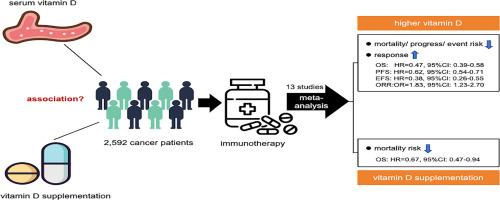Higher serum vitamin D concentration and supplementation were associated with improved survival outcomes and treatment response in cancer patients receiving immunotherapy: A systematic review and meta-analysis
IF 3.1
3区 医学
Q2 NUTRITION & DIETETICS
引用次数: 0
Abstract
Biological evidence has demonstrated the anti-tumor effects of vitamin D, but whether it could predict the effect of cancer immunotherapy remains inconclusive. We hypothesized that higher serum vitamin D concentration and supplementation might be correlated with better prognosis and treatment response among cancer patients receiving immunotherapy. We systematically searched the Medline, Embase, Cochrane Library, PubMed, and Web of Science databases to identify relevant articles from inception to June 19, 2025. We calculated the pooled hazard ratios (HRs) or odds ratios (ORs) with 95% confidence intervals (CIs) using a random-effect model primarily to determine the relationship between vitamin D and prognosis in cancer patients receiving immunotherapy. Thirteen studies involving 2592 cancer patients were included. Higher vitamin D concentration was associated with improved overall survival (OS) (HR = 0.47, 95% CI 0.39-0.58, P < .001), as well as progression-free survival (PFS), event-free survival (EFS), and objective response rate (ORR). For cancer subtypes, elevated vitamin D concentration was associated with improved OS in lymphoma patients receiving any immunotherapy. All included patients with solid tumors received immune checkpoint inhibitors (ICIs), and showed positive effects of higher vitamin D. Furthermore, a significant correlation was also observed between vitamin D supplementation and prolonged OS (HR = 0.67, 95% CI 0.47-0.94, P = .022). Higher vitamin D concentration and supplementation demonstrated improved treatment outcomes to immunotherapy in cancer patients. However, due to limited categories of cancers available, more high-quality studies with multiple cancers and treatment regimens enrolled are warranted before vitamin D supplementation could be administered to further improve the prognosis.

在接受免疫治疗的癌症患者中,较高的血清维生素D浓度和补充与改善的生存结果和治疗反应相关:一项系统回顾和荟萃分析
生物学证据已经证明了维生素D的抗肿瘤作用,但它是否可以预测癌症免疫治疗的效果仍然没有定论。我们假设在接受免疫治疗的癌症患者中,较高的血清维生素D浓度和补充可能与更好的预后和治疗反应相关。我们系统地检索了Medline、Embase、Cochrane Library、PubMed和Web of Science数据库,以确定从创立到2025年6月19日的相关文章。我们使用随机效应模型计算95%置信区间(ci)的合并风险比(hr)或优势比(ORs),主要是为了确定接受免疫治疗的癌症患者维生素D与预后之间的关系。纳入了13项研究,涉及2592名癌症患者。较高的维生素D浓度与改善的总生存期(OS) (HR = 0.47, 95% CI 0.39-0.58, P < 0.001)、无进展生存期(PFS)、无事件生存期(EFS)和客观缓解率(ORR)相关。对于癌症亚型,在接受任何免疫治疗的淋巴瘤患者中,维生素D浓度升高与OS改善相关。所有纳入的实体瘤患者均接受了免疫检查点抑制剂(ICIs)治疗,并显示出高维生素D的积极作用。此外,维生素D补充与延长OS之间也存在显著相关性(HR = 0.67, 95% CI 0.47-0.94, P = 0.022)。较高的维生素D浓度和补充证明了癌症患者免疫治疗的改善效果。然而,由于可用的癌症种类有限,在补充维生素D以进一步改善预后之前,需要对多种癌症和治疗方案进行更多高质量的研究。
本文章由计算机程序翻译,如有差异,请以英文原文为准。
求助全文
约1分钟内获得全文
求助全文
来源期刊

Nutrition Research
医学-营养学
CiteScore
7.60
自引率
2.20%
发文量
107
审稿时长
58 days
期刊介绍:
Nutrition Research publishes original research articles, communications, and reviews on basic and applied nutrition. The mission of Nutrition Research is to serve as the journal for global communication of nutrition and life sciences research on diet and health. The field of nutrition sciences includes, but is not limited to, the study of nutrients during growth, reproduction, aging, health, and disease.
Articles covering basic and applied research on all aspects of nutrition sciences are encouraged, including: nutritional biochemistry and metabolism; metabolomics, nutrient gene interactions; nutrient requirements for health; nutrition and disease; digestion and absorption; nutritional anthropology; epidemiology; the influence of socioeconomic and cultural factors on nutrition of the individual and the community; the impact of nutrient intake on disease response and behavior; the consequences of nutritional deficiency on growth and development, endocrine and nervous systems, and immunity; nutrition and gut microbiota; food intolerance and allergy; nutrient drug interactions; nutrition and aging; nutrition and cancer; obesity; diabetes; and intervention programs.
 求助内容:
求助内容: 应助结果提醒方式:
应助结果提醒方式:


